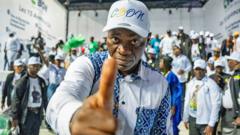As Gabon approaches a pivotal election with its first democratic vote since a bloodless coup in 2023, General Brice Clotaire Oligui Nguema stands poised to assume leadership, promising a departure from the traditional dynastic rule that has long governed the nation.
Gabon’s New Era: Coup Leader Embraces Democracy and Challenges Ahead

Gabon’s New Era: Coup Leader Embraces Democracy and Challenges Ahead
In a surprising turnaround, Gabon's coup leader emerges as a proponent of democratic elections following a military takeover.
In a historical shift, nearly 19 months after Brice Clotaire Oligui Nguema unseated the long-time ruling Bongo family in a bloodless coup, Gabon heads towards a democratic election this Saturday, breaking the trend of military leaders elsewhere in Africa clinging to power. Formerly an elite Republican Guard commander, Nguema now dons a politician's suit to contest the presidency against seven other candidates. Riding high on his popularity following the ousting of the Bongo dynasty, he stands as the overwhelming favorite, even as electoral regulations have sidelined several notable challengers.
His campaign’s catchy slogan, “C’BON,” cleverly intertwines his initials with the French phrase for “it’s good,” resonating with a populace eager for change. The key opposition figure, Alain-Claude Bilie-By-Nze, the last Prime Minister under Ali Bongo, represents a significant challenge, albeit one that Nguema seems likely to overcome in the first round of voting.
Winning the presidency would secure Nguema a seven-year mandate, equipping him with vital resources to drive development in a nation blessed with oil reserves and manganese exports, yet afflicted by poverty affecting over a third of its 2.5 million residents. Gabon’s relatively stable history stands in stark contrast to its war-torn regional neighbors, allowing Nguema's new government the opportunity for reform.
The military's takeover on August 30, 2023, replaced the Bongo regime just hours after authorities announced an ostensibly fraudulent election victory for Ali Bongo. Following years of political discontent and growing impatience over the Bongo family's firm grip on power, Nguema’s actions were widely celebrated. He has since cultivated a broad base of support, integrating former government officials and civil society figures into his transitional administration and releasing political prisoners, although remnants of the former regime, including Bongo's family, remain detained.
Unlike military leaders in France’s former colonies, who often adopted a confrontational stance towards Western influences, Nguema seeks to maintain amicable relations with France. Recently, both nations agreed on a new collaboration at Camp de Gaulle, formerly a French military base. Nguema has also initiated public works projects, promising economic revitalization while pursuing national interest in oil and mineral resources.
However, once elected, Nguema will confront considerable challenges, such as fulfilling public hopes for significant reform while navigating the demand for environmental conservation alongside economic development. As urban areas like Libreville cry out for better job opportunities and essential services, numerous voices within civil society, including trade unionists, reflect the potential for unrest in response to unmet expectations.
Despite the promise of change, Nguema’s ability to deliver on the widespread demand for social and economic advancement will dictate the trajectory of Gabon’s evolution away from its troubled political past. With victory imminent, the difficult task of governance and true reform is set to begin for General Nguema.
His campaign’s catchy slogan, “C’BON,” cleverly intertwines his initials with the French phrase for “it’s good,” resonating with a populace eager for change. The key opposition figure, Alain-Claude Bilie-By-Nze, the last Prime Minister under Ali Bongo, represents a significant challenge, albeit one that Nguema seems likely to overcome in the first round of voting.
Winning the presidency would secure Nguema a seven-year mandate, equipping him with vital resources to drive development in a nation blessed with oil reserves and manganese exports, yet afflicted by poverty affecting over a third of its 2.5 million residents. Gabon’s relatively stable history stands in stark contrast to its war-torn regional neighbors, allowing Nguema's new government the opportunity for reform.
The military's takeover on August 30, 2023, replaced the Bongo regime just hours after authorities announced an ostensibly fraudulent election victory for Ali Bongo. Following years of political discontent and growing impatience over the Bongo family's firm grip on power, Nguema’s actions were widely celebrated. He has since cultivated a broad base of support, integrating former government officials and civil society figures into his transitional administration and releasing political prisoners, although remnants of the former regime, including Bongo's family, remain detained.
Unlike military leaders in France’s former colonies, who often adopted a confrontational stance towards Western influences, Nguema seeks to maintain amicable relations with France. Recently, both nations agreed on a new collaboration at Camp de Gaulle, formerly a French military base. Nguema has also initiated public works projects, promising economic revitalization while pursuing national interest in oil and mineral resources.
However, once elected, Nguema will confront considerable challenges, such as fulfilling public hopes for significant reform while navigating the demand for environmental conservation alongside economic development. As urban areas like Libreville cry out for better job opportunities and essential services, numerous voices within civil society, including trade unionists, reflect the potential for unrest in response to unmet expectations.
Despite the promise of change, Nguema’s ability to deliver on the widespread demand for social and economic advancement will dictate the trajectory of Gabon’s evolution away from its troubled political past. With victory imminent, the difficult task of governance and true reform is set to begin for General Nguema.


















